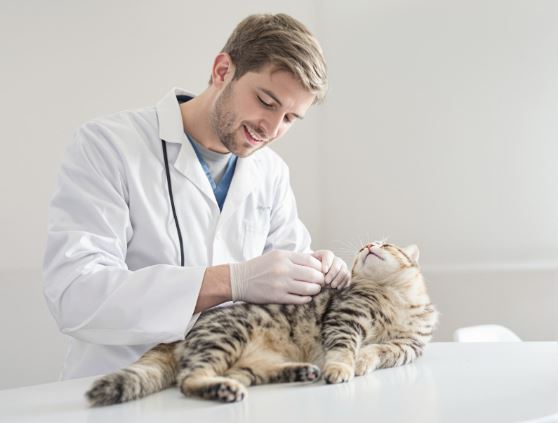Flea and Tick Medication for Cats: What You Need to Know

Key takeaways:
- Understanding your cat’s lifestyle and health needs helps in choosing effective flea and tick prevention, ensuring year-round protection.
- Consulting with a veterinarian can guide you in selecting safe flea medications tailored for your pet’s specific requirements.
- Combining natural methods (like regular vacuuming and cleaning) with vet-approved treatments offers a comprehensive approach to flea and tick control, safeguarding your cat’s health.
Your cat is a beloved family member, so it’s only natural to worry when they start scratching endlessly or seem restless. Fleas and ticks aren’t just minor annoyances; they can be a source of serious health concerns for your furry friend. If you’ve ever spotted tiny insects hiding in your cat’s fur, you know how stressful an infestation can be. These pests can result in allergic responses, infections, serious illnesses, and irritation. You can keep your cat safe, content, and flea-free throughout any season with the correct preventative techniques and assistance from your vet.
Since every cat has different habits and routines, flea and tick prevention should be customized. Some cats spend most of their time indoors, while others enjoy exploring outside. Regardless of their habits, year-round protection can keep them healthy.
PetHealthMD provides expert guidance to help you know your flea prevention options so you can make an informed choice with your vet. Today, let’s
Choosing the right flea and tick medication for your cat
While choosing the right flea and tick medication for your cat may seem challenging, it’s about understanding what works best for your pet’s unique needs. Each cat is different; selecting the right treatment depends on their needs and lifestyle. Fleas and ticks can be a source of discomfort, transmit diseases, and lead to serious health conditions, so finding the right solution is crucial. Here’s a look at different options to help you decide:
- Easy-to-apply topical treatments. These medications spread naturally across the skin, offering full-body defense against fleas and ticks for up to a month. Many topical treatments also repel and kill ticks before they can attach and transmit diseases, making them a convenient choice for comprehensive protection.
- Flavored chewable tablets. These tasty options provide full protection from the inside out, ideal for indoor cats or those who tend to groom off topical treatments. Many oral medications not only kill fleas but also eliminate ticks, breaking their life cycle and preventing infestations.
- Long-term protection with flea and tick collars. These collars slowly release medication over several months, offering peace of mind for cats that like to roam outdoors. Many flea collars also repel and kill ticks, reducing the possibility of tick-borne illnesses such as Lyme disease and cytauxzoonosis.
- Gentle treatments for sensitive cats. Specialized formulas consider factors like age and health conditions, ensuring safe and effective flea and tick control for kittens, older cats, and those with medical needs. Some natural or vet-approved options offer mild but effective protection against both pests.
- Regular monitoring is essential. Watch your cat’s response to treatment and note any behavioral changes to ensure the method works effectively. Checking your cat’s skin and fur regularly, especially around the ears, neck, and paws, can help detect ticks early before they pose a greater risk.
Ensuring the safety of flea and tick medications
If you’re wondering whether flea and tick medication is safe for your cat, you’re not alone. The good news is that these treatments protect your pet properly. While the FDA approves many flea and tick prevention options, it’s always best to check with a vet to find the safest choice for your cat. Research shows that vet-recommended medications are safer than some store-bought options, which may contain ingredients that aren’t ideal for cats.
Most cats handle flea and tick treatments well, but it’s crucial to consult your veterinarian before starting any new product and monitor your pet closely for any signs of discomfort. While uncommon, some cats may experience mild reactions such as skin sensitivity or changes in behavior—these usually go away quickly if caught early. Ticks can be particularly harmful because they latch onto a cat’s skin and feed for extended periods, increasing the risk of disease transmission. A vet can help you understand what to watch for and assist in choosing the right flea and tick protection, including using tools like flea combs and tick removers to check if the treatment is working effectively.
Exploring natural flea and tick control options
Thinking about using natural methods to keep fleas and ticks away? Many cat owners prefer a gentler approach, and while natural methods may not completely replace vet-approved treatments, they can still help. These include the following simple habits:
- vacuuming regularly
- washing your cat’s bedding
- using a flea comb and tick remover
While natural methods help maintain a flea- and tick-free home, studies show they work best with proven treatments. Ticks can be found hiding in carpets, furniture, and outdoor areas, making it crucial to keep your home and yard clean. A balanced approach that combines environmental care and vet-approved products provides the most reliable protection for your cat. This combination helps prevent future infestations and keeps your cat safe, but always check with your vet before deciding to make any changes to your cat’s flea and tick control plan.
Finding the best flea and tick treatment for your cat

The best flea and tick protection is the one that fits your cat’s lifestyle and keeps them happy and healthy. Whether they need a long-lasting collar, an easy oral chew, or a simple topical application, there’s an option that will fit their needs. Staying consistent and proactive is the best way to keep those pests away. From gentle topical treatments to convenient oral options, the best flea and tick treatment for your cat should match their lifestyle while keeping them fully protected.
Ready to find the right flea and tick protection for your cat? PetHealthMD is here to help you learn about and choose the best option to keep your feline companion happy and healthy, but always consult your vet for personalized advice tailored to your cat’s specific health needs to learn about prevention plans.





